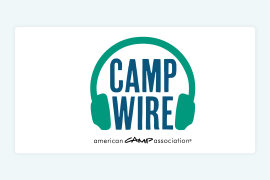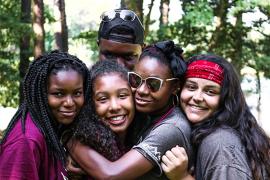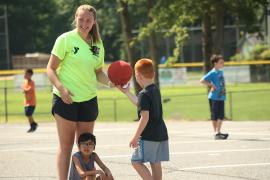Fatigue at camp is like inclement weather at camp. You’re going to have it at some point, but if you spot it before it happens, you can take steps to be prepared for it and reduce the impact it has on your staff and program. The American Camp Association’s 5-year study of injuries and illnesses in US camps (the “Healthy Camp Study”) indicated that fatigue was a contributing factor to injury and illness events and was an area needing additional study, so the Association of Camp Nursing set out to better understand fatigue and find strategies to reduce the negative impacts of fatigue (Dubin, Garst, Gaslin, & Schultz, 2019). This research validated what many people are probably thinking: fatigue is a serious issue that many staff face while working at camp, but it also suggested strategies for better managing fatigue.
So, what can we actually do? Let’s look at a few issues related to fatigue at camp and consider possible solutions to mitigate fatigue.
Research says: Increasing time off will not necessarily reduce fatigue. Camp staff may try to get work done during time off, or may travel, go out, and otherwise use time off in ways that will increase rather than reduce fatigue.
- Possible solutions: Format time off to encourage rest; this may mean starting a “day off” at night in order to give staff the opportunity to sleep in. Teach staff the signs of fatigue and the value of rest, while encouraging rest during time off. Shift your camp culture to view fatigue as a hazard, rather than a sign of dedication.
Research says: Sharing space with other people can be fatiguing. Many staff grow up with their own rooms, and few are used to living in the communal living arrangements common to most camps. At camp there is often little privacy and limited space to decompress.
- Possible solutions: Provide staff with spaces where they can unwind and have some alone time. Can you offer them a quiet space to “get away” for a bit or take a nap? This is particularly important for staff who find it necessary to spend their time off at camp.
Research says: Around the clock childcare is mentally, emotionally, and physically fatiguing for staff who are likely new to such responsibilities. Staying awake when a child is ill or homesick is physically fatiguing, while assuming the role of primary caregiver for an extended time can be mentally or emotionally fatiguing.
- Possible solutions: Provide evening programs where staff can gather and relax together. Increase social support for staff so they feel cared for, and consider providing mentors who can listen without judgement. Plan activities where staff can take a more passive supervision role while campers play.
Research says: Camp nurses experience fatigue due to the lack of staff with medical training who can relieve them if they need a break.
- Possible solutions: Consider implementing shifts so that nurses are not always on duty. Cross train staff to fill in for nurses when they need breaks. Assign non-nursing staff to help with non-medical duties in the health center, such as doing laundry, making beds or checking refrigerator temperatures. This also offers front line staff a mental break from childcare duties!
Remember directors: you are a critical role model for your staff. Make sure you are taking breaks and getting enough rest to show that everyone, even the camp director, needs to take fatigue seriously. You can’t run camp if you’re asleep at the wheel!
What suggestions will you try to reduce fatigue during the summer of 2020?
Reference
Dubin, A., Garst, B., Gaslin, T., & Schultz, B. (2019). The experience of workplace fatigue in summer camp: Perspectives from camp healthcare providers and directors. Journal of Experiential Education. https://doi.org/10.1177/1053825919869367
Ali Dubin is a PhD Candidate at Clemson University studying Camp Management. Ali worked for the Girl Scouts for eight summers at camps in NY and VA. Outside of fatigue in camp, her research focuses on issues in camp administration, with a specific focus on children with Severe Food Allergy and the constraints to participation that they face.
Barry A. Garst, PhD, is an associate professor of youth development leadership at Clemson University and the former director of program development and research application with the American Camp Association. His applied research focuses on critical and emerging issues facing out-of-school time youth program providers, with an emphasis on understanding the needs and concerns of parents. He also chairs the research committee for the Association of Camp Nursing.
This blog was written as part of Project Real Job’s initiative to support camps with staff recruiting, hiring, and retention efforts.
The views and opinions expressed by contributors are their own and do not necessarily reflect the views of the American Camp Association or ACA employees.



